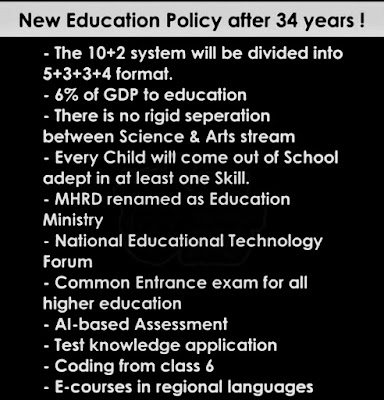Education Policy 2020
 |
The education system which we have followed for several years is changing. New education policy has been formulated after 34 years.
Let us take an example -
If a student wants to crack UPSC or any civil services examination, he/she opts for the science stream and completes their engineering. Now he prepares for UPSC which has little to no relation with science and technology. All the skills and knowledge he acquired during his college time are not of use.
In today's time 90% marks in board exams are not "good enough" to get admission in top colleges. The child not being selected in top college is parents biggest concern.
In the past education system the student, who can remember the most and not necessarily make head or tail of it, score maximum marks, Which is the benchmark for success in today's world, and students who have practical knowledge of the world, fall behind.
NOW ALL THIS IS GOING TO END
According to the new education system now students will have the option to choose what they want to learn.
CHANGES IN EDUCATION SYSTEM
Till now, our school system followed the 10+2 rule (i.e., 2 parts), but NEP-2020 changes this to the 5+3+3+4 rule (i.e., 4 parts).
1st part is from playschool to 2nd class (3 to 8 years). The goal is to get students to understand the language and build their basic literacy.
2nd part is from class 3rd to 5th class (8 to 11 years). This is the preparatory stage.
Till class 5th, the school has the liberty to teach in their regional language.
3rd part is from class 6th to 8th (11 to 14 years). From this class, coding will become mandatory for students. Students will be introduced to all the subjects which would help them to choose subjects in the higher class. They will have to build projects.
4th part is from class 9th to 12th (14 to 18 years). From this class, students have to choose their subject. They are given choices for what they want to study. If they want they can learn both science and political science, or any other combination. No discrimination among subjects.
The student can choose science or arts, curricular or extracurricular, or any of the options given. Extracurricular activities like dancing, singing etc. will also become the main subjects. Now it depends on the students what they prefer to study.
JOINT ENTRANCE EXAMINATION-
For JEE, it is left for the NTA to decide what will be best for the exam.
The common entrance exam for higher education.
6% of GDP to education
For college students
The student is allowed to take drops between college years, and resume their education after the issue has been resolved, within a defined period. For example, a student wishes to take a drop after completing their 1st year. After some time, he returns to continue his education. He can continue directly from his 2nd year, unlike the old policy, where he will have to complete the 1st year again, which he has already done. Same goes for the other 4 years.
After completing the 3rd year, you will get a bachelor's degree. So now those who want to appear for UPSC or other exams, they can leave after 3rd year. The 4th year is for those who want to pursue higher studies in that field. After completing the 4th year, you get a complete 4 year degree. Virtual labs will be built. The government will control the private college fees so that they cannot charge high.
M.Phil is now removed. Students can complete their PhD in 4 years. For research, all the students will get funding.
Now all the students with skills and knowledge are going to have a great future.
All these policies will be implemented in the Academic year 2023-2024.


A very useful article. Thank you.
ReplyDeleteWelcome
ReplyDeleteVery useful article!
ReplyDeleteOne of the Good article for current education system changeover information.
ReplyDeleteThankyou
ReplyDeleteVery useful article
ReplyDeleteNice work
ReplyDeleteNice info!!...
ReplyDeleteAmazing write up...
Appreciable efforts...keep going bro!!!
ReplyDeleteKeep going bro
ReplyDeleteNice article
ReplyDeleteA very very useful article
ReplyDeleteThis article is very helpful which explained new education policy in easy terms.
ReplyDelete👍👍
ReplyDeleteNice startup move on good efforts all the best. Only one suggestion critically analyse the content
ReplyDeletePost a Comment
Please dont do any type of spam.